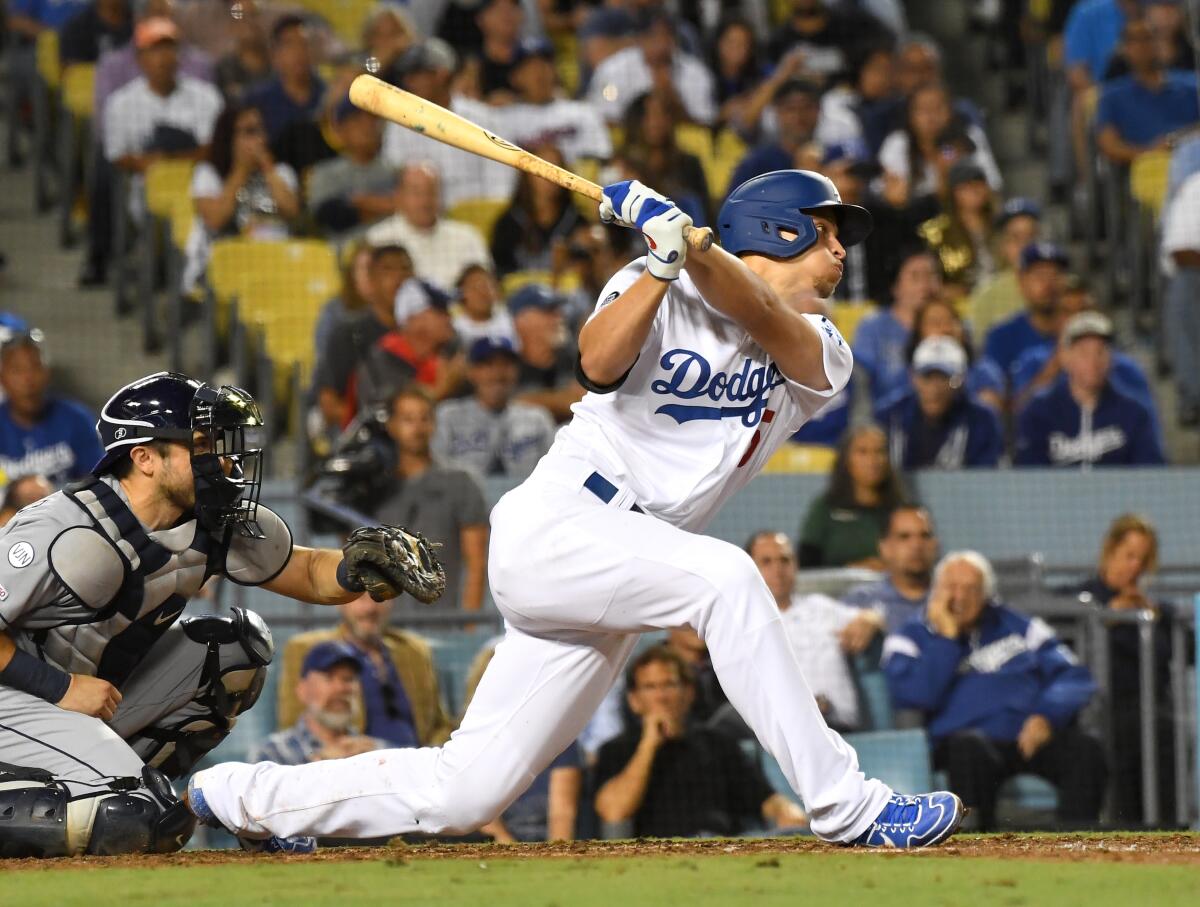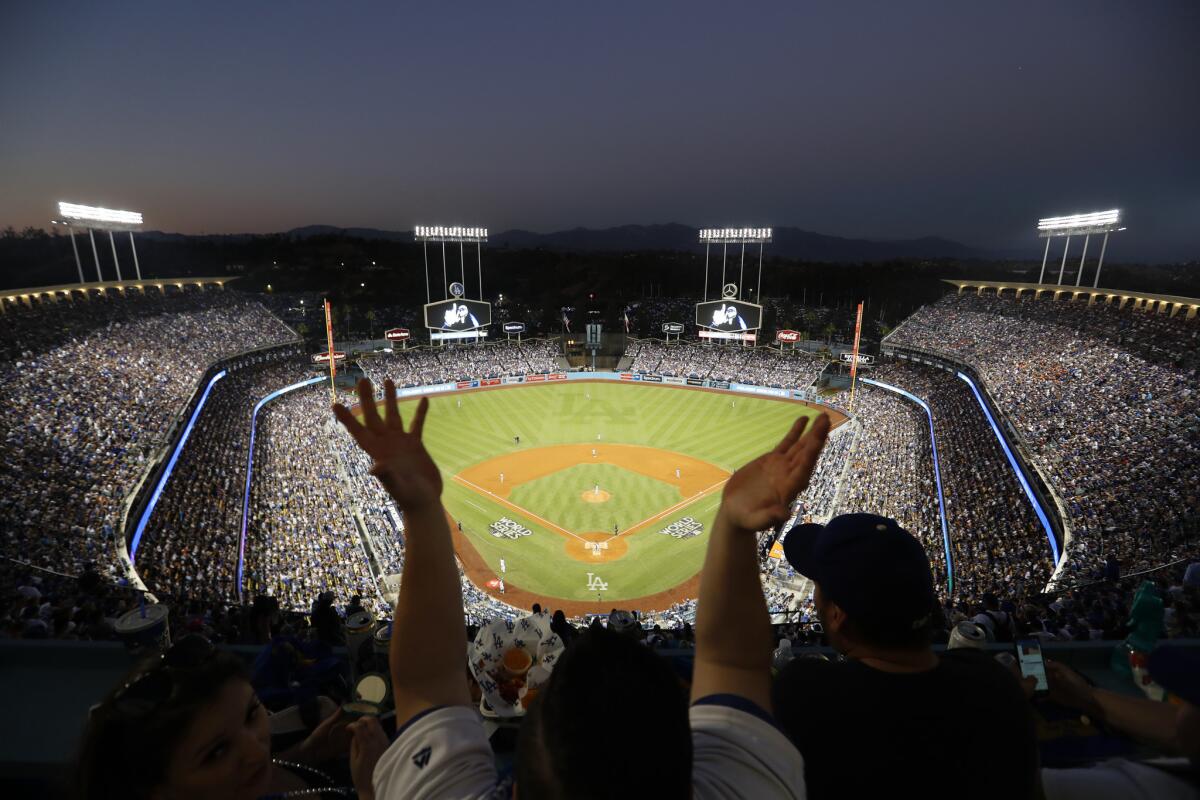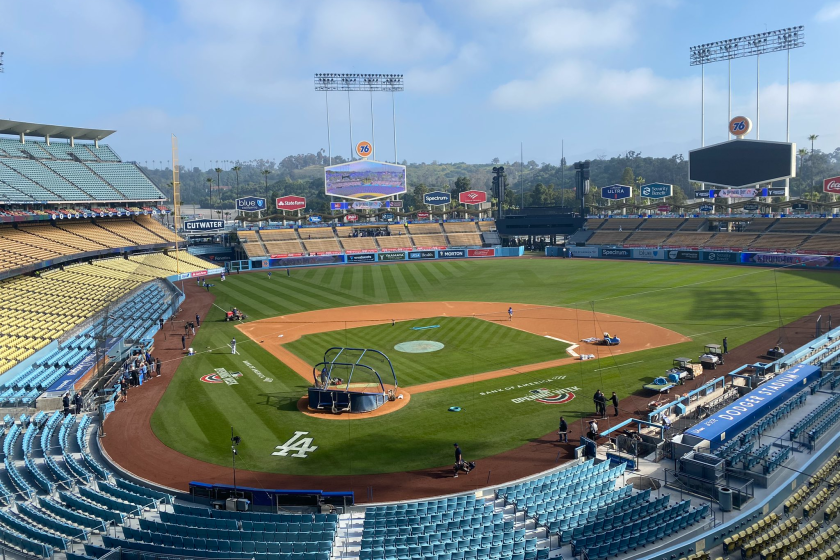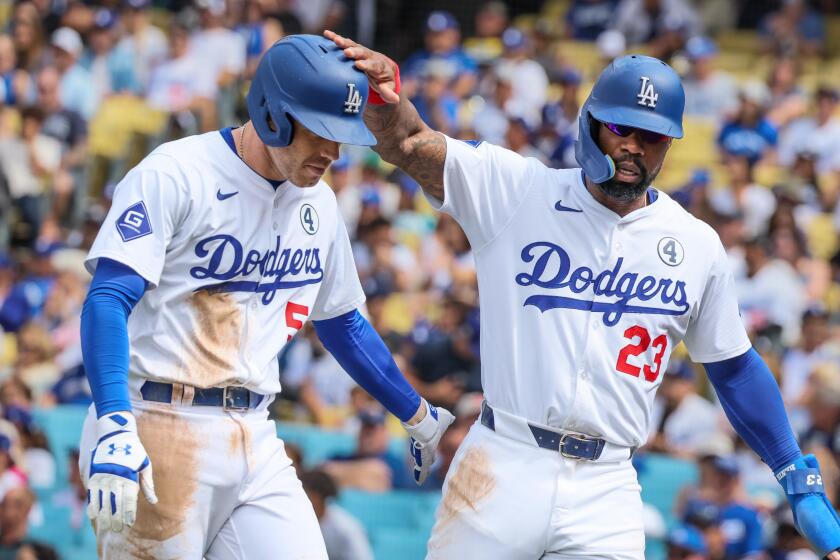Column: Decks are stacked against opponents at Dodger Stadium this season

When talking about the power playoff force that is Dodger Stadium, everybody focuses on the sound.
Ross Stripling, however, says it’s all about the sight.
“Some of these younger guys from other teams, they maybe haven’t been in a playoff atmosphere before, then they step on our field and look up,” Stripling said.
And there it is, a view so familiar to Dodgers fans but so imposing to outsiders.
Four decks.
“There’s four decks behind home plate, four separate decks of people staring down at you, something you rarely see anymore,” Stripling said. “It can be very intimidating.”
Four decks. Four roaring and bouncing and smothering decks.
That’s what the Dodgers are still playing for. That’s why their final 10 games are still so important. That’s the stakes here, those four decks, rising above the field like an Elysian Hill with a loud voice and swaggering personality, a little mountain that moves.
Adam Kolarek, the sidearm-throwing left-hander acquired from the Tampa Bay Rays at the trade deadline, has delivered steady results for the Dodgers.
“Having 50,000 people every night screaming for you, we have a huge advantage here,” Stripling said Tuesday afternoon. “We love playing here.”
They love it enough to compete to the end of September so they can play here for most of October. This was evident later Tuesday when they grinded their way to a 7-5 victory over the playoff-hopeful Tampa Bay Rays.
The Rays are the ones battling for a wild-card spot, yet it was the long-since-clinched Dodgers who battled out of a 2-all tie with five runs in a textbook seventh inning fueled again by the raucous fans.
“We play well at home … there’s a reason we draw more than anybody in baseball,” said manager Dave Roberts. “Crowd was into it… I know, September baseball, but this was kind of that playoff atmosphere.”
The Rays sent a rookie pitcher named Peter Fairbanks to the mound and he crumbled under the pressure from the Dodgers hitters and their background singers.
Fairbanks dropped a throw at first base on a Max Muncy grounder. The stadium shook. Three pitches later, Enrique Hernandez doubled into the right-field gap. The noise grew. Two pitches later, Corey Seager doubled into the left-field gap to score two runs and Fairbanks was enveloped in screams and whistles and stomps.

By the time Fairbanks left the mound, the Rays trailed by three and the buzz was relentless and the four decks had won again. The Dodgers had to survive the usual bullpen scare, but they did survive, and now, as crazy as it sounds during this lull before the postseason, they need to keep winning.
They hold a five-game lead over the Atlanta Braves for home-field advantage in the National League playoffs.
They trail the New York Yankees and Houston Astros by one game for the best record in baseball and home-field advantage for the World Series.
This is a big deal, first because the Dodgers are so good at home. Like the man said, they love playing there.
They are 57-20 at Chavez Ravine, which is more wins than four other teams have earned for the entire season. They are tied with the Astros for the best home record in baseball.
Dodgers pitcher Rich Hill plans to return from a knee injury next week and pitch against the Padres. He threw 22 pitches off the bullpen mound Tuesday.
As part of this accumulation, they have 12 walk-off wins, only three short of the Los Angeles record, and two more than that magical 2017 team.
“We never think we’re out of it, especially at home,” Russell Martin said earlier this year. “As long as there are outs left, we still believe we have a chance.”
So does the crowd, which sticks around for the close ones, and when the place is full, you can almost feel their heat. With every pitch they get louder and the Dodgers dig deeper.
“You hear them really well…you definitely hear them,” said Kenley Jansen, who was cheered through a four-out save Tuesday. “It’s more comfortable playing at home, a better environment for all of us.”
Jansen has been occasionally booed this year during his earlier struggles, but he gets it, and loves the fans who have often roared for him from “California Love” to “I Love L.A.”
“Even when you hear some boos, I understand, it’s just, get better,” he said. “They see me always in a high standard, I want to see myself there too…I know they’re going to have my back no matter what…that’s why I believe in these fans.”
Playing at home is also a big deal because, as much as the Dodgers love it here, other teams also seem to hate it.
Late innings, they wilt. Tight games, they make mistakes. You saw this Tuesday night. You see it often.
The noise can be overwhelming, literally shaking the decks with its vibration. The noise is also consistent, occurring every time a Dodger connects on a swing or makes a play on the field. The cheers for home runs are only slightly greater than the roar for a single.

The noise seeps into opponents’ heads. It worms into their arms. On an early July night against the Arizona Diamondbacks, it took full possession of their spirit.
Remember that? The Diamondbacks walked five consecutive Dodgers with two out in the ninth to give the Dodgers a literal walk-off 5-4 win.
Greg Holland walked four, T.J. McFarland walked one, and, according to Elias, the Dodgers became the first team since 1920 to enda game with five consecutive walks without an out occurring during that stretch.
“I don’t think I’ve ever really been part of a game like that,” Diamondbacks manager Torey Lovullo told the Arizona Republic’s Nick Piecoro afterward.
Fast forward to Tuesday, when Roberts was asked about playing for home-field advantage.
He used the word “important” three times in his answer, and concluded with, “If we can secure the best record, it would be great.”
Four decks are waiting.
More to Read
Are you a true-blue fan?
Get our Dodgers Dugout newsletter for insights, news and much more.
You may occasionally receive promotional content from the Los Angeles Times.













